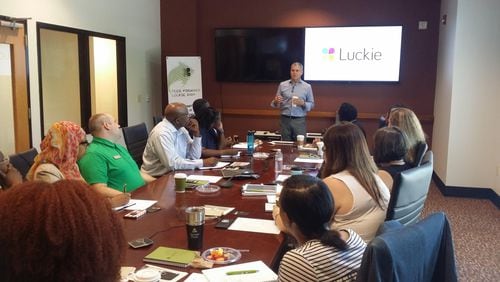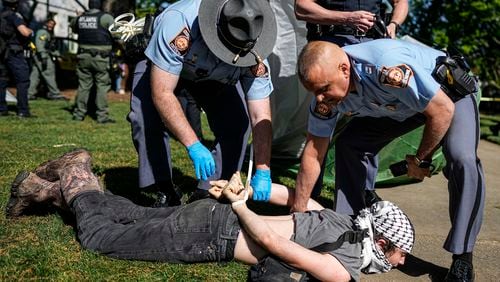While school’s out for students, many teachers take advantage of opportunities for training and development such as Gwinnett County Public Schools’ Back to Industry Day earlier this month. Nearly 150 career and technical education teachers visited local businesses to learn industry trends, day-to-day work life and best practices, to gain insight into an ever-evolving job market.
GCPS has nearly doubled the number of CTE teachers over the past five years in an effort to increase rigor and relevance. Administrators say they want students preparing for college and a career challenged by classwork, but also exposed to relevant learning experiences in real industry.
“The more opportunities for learning help the creative pipeline,” said Jody Reeves, executive director of GCPS’s Department of Academies, Career and Technical Education. “These partnerships and sponsorships enhance project-based learning and give the teachers more insight into teaching creative solutions.”
Gwinnett teachers of engineering, family and consumer science, health care science, marketing, and finance and business spent a day at one of nearly a dozen companies participating in the event.
Reeves said the diversity and level of training from businesses and industries is invaluable. Teachers use business leaders as guest speakers, design projects around real case studies, and collaborate with local businesses for career exploration.
Reeves said the district works with Partnership Gwinnett, the county chamber of commerce as well as advisory councils. Forty-nine companies offer job shadowing, feedback on curricula, seminars and other training opportunities throughout the year.
The summer just gives extra time for longer and more intense training.
This was the first year Luckie & Co. participated in the daylong event, but President John Gardner is determined that it won’t be the last.
“We’ve been involved in several education events over the years,” he said. “We sponsored a ‘principal for a day’ and worked with the chamber on other projects.”
After a call seeking more businesses to participate, Gardner said his staff put in a few hundred man hours coming up with a curriculum and exercises for the teachers. In addition, several staffers dedicated a full 8-hour day to the actual training.
“Our goal was to let them see how marketing solutions develop using technology, media, creativity, data and other components.”
He believes the effort will pay off in the long run with a better prepared workforce.
Luckie & Co. recently announced it will also support three student initiatives in the University of Georgia’s Grady College of Journalism and Mass Communication for one year. That may give employees and clients insights and data about ‘Generation Z,’ the demographic group spanning the mid-1990s to today, the largest segment of the North American population.
“I feel Back to Industry is very useful to teachers. It allows us to see what is going on in industry and apply it to our lessons in the classroom,” explained Faith Davenport, a marketing teacher at Mill Creek High School. “I truly enjoyed my day at Luckie & Co. I feel that I have a better understanding of what a full-service marketing firm does.”
These kinds of partnerships can be a win all around if done right, said Theodore J. Kopcha, associate professor in the Department of Career and Information Studies in the University of Georgia’s College of Education.
“One thing that is often overlooked is how this training can immediately be used in the classroom,” he said. “The focus is on the technology or the skills or the content, and the teacher may not know how to apply it to learning.”
Kopcha said taking the training beyond the one event is a way to evolve the experience.
“Longevity is the key,” he said. “A workshop with a follow-up support in the form of a Facebook, Twitter hashtag will allow participants to share ideas and best practices and let the business stay involved.”
Kopcha also suggested allowing the teacher to take a case study and let the students solve it.
“This kind of interaction is beneficial on all sides,” he said.







